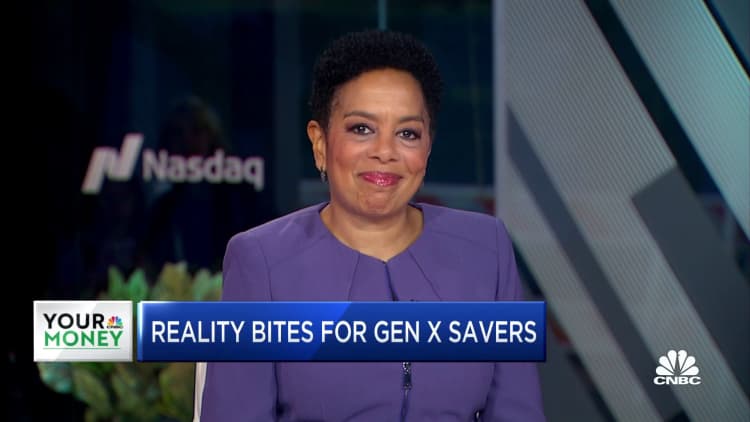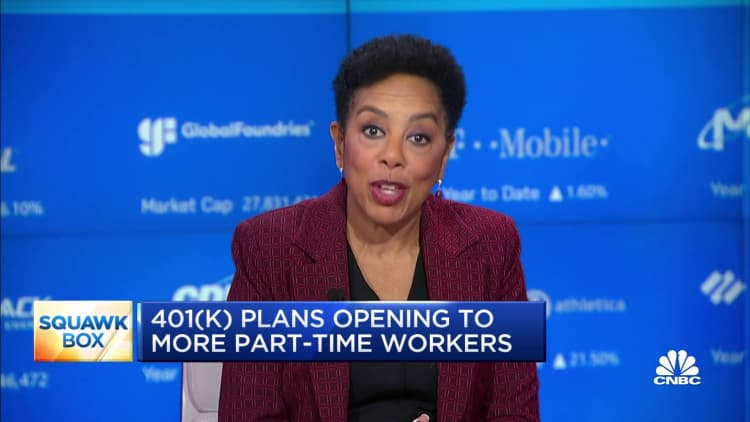Moyo Studio | E+ | Getty Images
Roughly half of Americans don’t have access to a workplace retirement plan — but states are increasingly stepping in to fill that gap, both for residents’ wellbeing and their own.
About 57 million people — 48% — don’t have access to a pension or 401(k)-type plan at work, according to the University of Pennsylvania’s Pension Research Council. Yet, Americans are 15 times more likely to save for retirement when they have a workplace plan, AARP Research found. (They’re 20 times more likely to do so if automatically enrolled.)
By the end of 2023, seven states — California, Colorado, Connecticut, Illinois, Maryland, Oregon and Virginia — had launched so-called “auto-IRA” programs to try filling the 401(k) access gap, according to Georgetown University’s Center for Retirement Initiatives. Oregon was the first state to do so, in 2017.
More from Personal Finance:
More retirement savers are borrowing from their 401(k) plan
Why employers can force out small 401(k) accounts once a worker leaves a job
Job data shows two kinds of workers: the ‘haves and have nots’
What is an auto-IRA?
Auto-IRA is shorthand for an automatic-enrollment individual retirement account. These programs require companies of a certain size to offer a workplace retirement plan of their own or facilitate payroll deduction into a state-sponsored IRA, at no cost to the employer.
If the latter, part of workers’ paycheck would be automatically contributed — generally 3% to 5% of earnings — to the state plan. Workers can opt out.
More than 800,000 workers participate in auto-IRAs, which hold more than $1 billion in total savings, according to The Pew Charitable Trusts.
They save about $165 a month, on average, said John Scott, director of Pew’s retirement savings project.

“This is a significant amount of money each month for these workers, many of whom, I’d say, have never saved for retirement in their lives,” Scott said.
About 195,000 employers are facilitating payroll deduction into a state auto-IRA, Pew said. It’s unclear how many other companies instead opted to sponsor their own 401(k) plan or other workplace plan.
More states are poised to bring programs online in the next few years: Delaware, Hawaii, Maine, Minnesota, Nevada, New Jersey, New York and Vermont, according to the Center for Retirement Initiatives.
(Other states — like Massachusetts, Missouri, New Mexico and Washington — have created different programs, in which employer participation is voluntary. Hawaii’s forthcoming program is also slightly different since it doesn’t automatically enroll workers, meaning they must opt in.)
Why states are stepping in
There’s a common thread here: A realization that people aren’t saving enough for retirement, Scott said.
Companies have shifted away from pensions in favor of 401(k)-type plans, pushing the savings responsibility more onto workers. The typical saver age 55 to 64 has just $71,000 of 401(k) savings, according to Vanguard data.
All except the highest-income baby boomers are projected to fall short of a sustainable retirement income, even after accounting for Social Security, according to a separate Vanguard analysis. (High-income boomers are those in the 95th percentile by income. Their median annual income is $178,000.)
This is a significant amount of money each month for these workers, many of whom, I’d say, have never saved for retirement in their lives.
John Scott
director of retirement savings at The Pew Charitable Trusts
Meanwhile, the U.S. population is aging.
In the 1980s, there were 3.9 working-age households for every elderly one, according to the Center for Retirement Initiatives. That ratio has since declined to about 2.5.
Absent a policy tweak, these trends are expected to put financial stress on states. A growing pool of older adults with too little money to fund their lifestyles may mean states need to spend more on public assistance program, for example, experts said. Working adults may also need to shoulder a greater tax burden.
Pew estimates that state spending will rise by $334 billion from 2021 to 2040 due to insufficient retirement savings.
Lack of 401(k) access has disproportionate impact
Some lawmakers have tried but failed in recent years to create a national auto-IRA or similar program.
Lack of 401(k) access disproportionately hurts certain groups, like those who work for small businesses, according to the Center for Retirement Initiatives. Access gaps are also larger among lower-income workers, younger workers, minorities and women.
As such, participants in auto-IRAs skew female, younger and unmarried, Pew found. A greater share are people of color and have only a high school education.

Automatic enrollment into such plans is meant as a behavioral nudge to overcome procrastination, a typical roadblock to enroll in a 401(k) plan. About 30% of people opt out, Scott said.
Since the accounts are Roth IRAs, they can also serve as emergency funds. Scott said. Such accounts allow investors to withdraw their contributions (but not necessarily earnings) at any time and any age without penalty, since they’ve already paid income tax on that money.
Auto-IRA drawbacks: ‘These are not perfect programs’
There are some drawbacks to auto-IRAs, experts said.
For one, IRAs have lower annual worker contribution limits than 401(k) plans: $7,000 versus $23,000 in 2024, respectively. (Just 15% of savers maxed out their 401(k) contributions in 2022, according to Vanguard data.)
Additionally, there isn’t an employer match — the “free” money workers get from companies that sponsor a 401(k) plan. About 80% of 401(k) plans offer a match, according to the Plan Sponsor Council of America.
Auto-IRAs also don’t cover all state workers, either. Gig workers, for example, don’t have access. The smallest companies may not be required to participate, depending on state rules.
“These are not perfect programs,” Scott said. “But this works. People are saving for retirement.”







